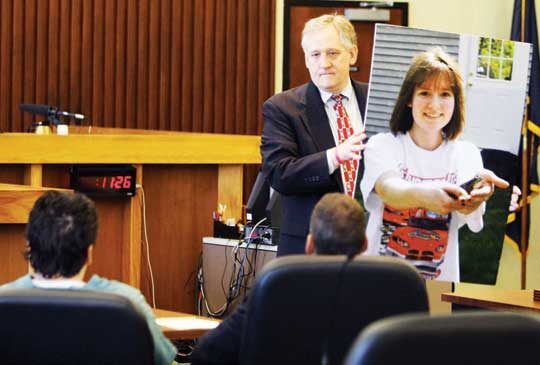Click here to view the state Supreme Court’s oral arguments Sept. 21 on the Seth Mazzaglia case.
CONCORD – The question of whether New Hampshire’s rape shield law extends from the trial courtroom to the appeals process was central to the argument made before the state Supreme Court Wednesday.
The attorney for convicted murderer Seth Mazzaglia argued before the justices that his client’s appeal rests on revealing details of the murder victim’s sexual history, a development that would have a chilling effect on future rape victims, according to advocates who oppose any such idea.
The attorney handling Mazzaglia’s appeal, Christopher M. Johnson, argued that Mazzaglia’s trial attorney should have been able to introduce Lizzi Marriott’s prior sexual history at trial, something Strafford County Superior Court Judge Steven Houran ruled irrelevant twice during the 20-day trial.
The jury found Mazzaglia guilty on June 27, 2014, of two first-degree murder charges. The former Dover resident, now 32, is serving life without parole for the October 2012 murder of 19-year old UNH student Lizzi Marriott. Mazzaglia argued at the trial that his live-in girlfriend, Kathryn McDonough, actually had more to do with the young woman’s murder. McDonough testified for 10 days against Mazzaglia and was sentenced to one- to three-year prison sentence for her part in the resulting cover-up, lying about the disappearance and death of her co-worker. She was released from prison in July.
After McDonough said Marriott died during a rough sex act, she said she helped her boyfriend dump her body in the Piscataqua River near the ocean in Portsmouth. Marriott’s body has never been found.
Attorney Johnson argued that the rape shield rule protects a witness during the trial and should not apply during the appeals process.
Assistant Attorney General Peter R. Hinckley argued that a ruling in Mazzaglia’s favor would affect other sealed records.
Marriott’s family also opposes releasing any of the victim’s personal details, and the family’s attorney, Cyrus F. Rilee III, asked the justices that information sealed during Mazzaglia’s trial remain private during his appeal.
The question before the New Hampshire Supreme Court is whether a victim’s privacy rights take precedence over the public’s right to an open court process. After Wednesday’s oral arguments, the court took the matter under advisement. At a news conference held after the hearing, victim rights advocates said this groundbreaking issue will have far-reaching consequences.





